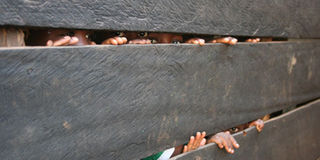Prime
Uneb bans exam cheating teachers

Pupils of St. Mary’s Nursery and Primary School, Kipamba Zone in Makindye, a Kampala suburb, peep through openings of their classroom yesterday. This followed a directive by KCCA officials to close down all schools that do not meet licensing and other requirements, including proper toilets. PHOTO BY ABUBAKER LUBOWA.
What you need to know:
Cleaning up house. Even as the national examinations body clears 633 candidates of the allegations, results of 965 pupils have been cancelled.
The Uganda National Examinations Board yesterday blacklisted school administrators found to have abetted cheating in last year’s Primary Leaving Examination. This follows an investigation into malpractices that led to the withholding of the PLE results for about 1, 603 candidates early this month.
Uneb executive secretary Mathew Bukenya said external assistance to candidates was the most common malpractice, followed by collusion, impersonation and substitution.
However, he told a news conference in Kampala that some 633 candidates had been cleared of the allegations. But the results of 965 pupils were cancelled, and Uneb that they could repeat the class.
Some 61 head teachers, supervisors and invigilators have been blacklisted and barred from working in any schools administering Uneb examinations.
Mubende’s Namabaale Primary School head teacher and his deputy were debarred and Uneb demanded that disciplinary action be taken by the local Chief Administrative Officer (CAO).
Also affected are the heads of Rwamukora PS and Kigangazzi PS, Bukomasimbi.
Mr Bukenya explained that because primary schools are under local governments, they had written to the CAOs, demanding that disciplinary action be taken against the teachers.
“It is difficult for us to determine what action the CAOs will take, but in some cases it will call for dismissal,” he said.
However, he warned that in districts where the CAOs would fail to act, Uneb would intervene and involve the police.
The centre number for Norah Junior School in Wakiso District was suspended because they do not have a head teacher.
Uneb deputy boss Chrysostom Kibeti said: “We have done investigations but chief administrative officers can also do their investigations. The gravity of the punishment will depend on what they establish.”
Mr Bukenya said the districts had until April 15 to act.
Mr Kibeti explained that although Uneb had managed to curb exam leakages with increased security, malpractices had been rising.
Exam malpractice
Since 2001, when the body reported close to 12,000 candidates involved in malpractices, the number had dropped to 100. But he said the cases had started rising again. In 2011, there were 740 cases, and last year, 965.
But the Uneb officials were optimistic that the cheating would be eliminated if their recommendations were implemented. A total of 543, 071 pupils sat last year’s PLE, with 88.4 per cent passing the exams.
Meanwhile, several schools around the city yesterday defied orders by Kampala Capital City Authority (KCCA) to shut down immediately for allegedly failing to meet the required standards.
The operation that started in the morning revealed irregularities in many schools.
More than 10 schools had by yesterday been told to close down until all the requirements were met.
Despite KCCA having issued warnings last year, many schools have not been licensed, and this allowed the perpetuation of irregularities. The schools were found to have poor sanitation standards and operating in substandard structures.
Others could not produce the documents confirming that their teaching staff are qualified. In one school in Makindye Division, a teacher was found teaching three classes (Baby, Middle and Top) in a shack and the lessons were way above the pupils’ development age.
A Uwezo report released last year ranked Ugandan pupils as the slowest in the East African region. It noted that proportion of Ugandan children that pass both the literacy and numeracy tests is lower than in Kenya and Tanzania from P1 to P5.
Mr Prosper Lwamasaka, the head of Schools Inspection Directorate at the KCCA, said: “The main cause of low levels of numeracy and literacy skills is majorly teaching pupils work that is way above their ability and this can cause mental disorder.”



